- Home
- Michael Grant
BZRK: Apocalypse Page 2
BZRK: Apocalypse Read online
Page 2
Noah brought her pieces of lobster on a small china plate.
“We’re out of wine,” he said.
“Good. Time to sober up, anyway.”
“Is it?” he asked. “Why?”
She sat up and reached for her T-shirt. He interrupted her with a kiss and gently stroked her breasts as if saying good-bye to them. “I quite like these,” he said.
“I guessed that. Can I put on my shirt now?”
“I suppose.” He started to dress as well: shorts, a T-shirt, sandals. He reached down and pulled her to her feet.
“I’ll call for our cab,” Sadie said. She pressed the talk button on a handheld radio—there was no cell-phone reception this far up-island.
Five minutes later, as they packed up the picnic, a glittering white cabin cruiser appeared around the point.
The captain gave a little toot-toot on the horn, and the boat blew up.
It took a few seconds for the flat crump! of the explosion to reach them. It took a bit longer for the debris to splash into the water.
And just like that Sadie and Noah were Plath and Keats once again, running now, food and blanket forgotten. McLure security men were tearing along the beach from north and south, assault rifles in their hands, yelling, “Get under cover, get under cover!”
The boat burned for a while—there was no possibility of anyone having survived—and then it slipped beneath gentle waves that were a very similar color to Noah’s eyes. The pillar of black smoke was smothered. A black smudge rose until it was caught by a breeze and blown away over the island.
Vacation was over. The war for the human race was back on.
THREE
The roll that had begun was accelerating. The ship’s ballast had shifted decisively. It rolled onto its side, sending the flames shooting hundreds of feet into the air.
The inside of Benjaminia was a slaughterhouse—dead Marines, many more dead residents hung from bloody catwalks. The sphere turned on its axis, and floors became walls. Bodies fell through the air.
Like the turning drum of a dryer, the sphere rolled on, and now people clinging to desperate handholds fell screaming and crashed into the painted mural of the Great Souls.
Water rushed in through the opened segments.
The blowtorch submerged but burned on and turned the water to steam as the Doll Ship sank, and settled on the harbor floor.
When the Doll Ship sank, the Armstrong Twins had found themselves in Hong Kong’s Victoria harbor.
They could not swim. With some effort, and if they felt in a cooperative mood, they could manage to walk, dragging the useless third leg. But swim?
It was Ling who had saved their lives. Tiny, ancient, birdlike Ling. She had cupped her hand beneath their chin and churned the filthy water with her legs. She’d sunk beneath the waves repeatedly, rising each time to gasp in a single breath mixed with salt water, to cough and gag, and yet to keep her legs churning, until a fishing boat had come to the rescue.
They would find a way to reward Ling. They vowed that. She had saved their lives and very nearly died herself.
The Armstrong Twins had made their way from Victoria harbor to Vietnam, where they had financial interests and owned a small but useful number of local government officials. From there they’d made their way to Malaysia, to the Sarawak state on the island of Borneo.
The Armstrong facility there was involved in mining rare earths. And it did a bit of logging, as well, all very eco-friendly, with careful replanting programs and all of that. Whatever it took to avoid too much scrutiny. The Armstrongs were good corporate citizens out of self-interest.
But this facility was not strictly about mining or logging. It was built of three elements: there were two identical buildings, each a crescent, facing each other across an elongated oval that formed an enchanting tropical garden, a sort of tamed version of the surrounding rain forest.
There were trees and flowers, streams full of fish and waterfowl, pink gravel pathways leading to benches, and seating areas where the white-collar employees could take their lunches alfresco.
At the top of the oval, connecting the two crescents, was a stumpy tower topped by a domed observatory. There was an impressive optical telescope that profited from the profound darkness of the surrounding countryside.
No one was using the telescope at the moment because it was pouring rain. It often poured rain here. And when it poured it was unlike anything Charles Armstrong had ever known in New York. It came down not in drops but in sheets. The heavens did not sprinkle on Sarawak, they emptied buckets and bathtubs and swimming pools.
Charles watched a lizard climbing up the glass side of the dome, pushing against the stream of water. Sarawak had lizards. It had lizards and snakes and birds in abundance.
“I would have thought the rain would wash it off,” Charles said.
His brother, Benjamin, was less interested by the lizard or the rain, but of course could see both since it was impossible for the twins not to face in the same direction. Their individual eyes could roam this way or that, focus independently under the direction of their separate brains, but they did not have separate heads, rather two heads melded together.
This gave them two mouths, one nose, and three eyes. The middle eye was a bit smaller than the other two and often had an unfocused, glazed quality. It could see, but its focus was not consciously directed by either Charles or Benjamin. Rather it often seemed to have a mind of its own and would focus where it willed, suddenly granting depth perception to one or the other twin, but never both at once.
They were large, the twins were, tall but even more broad, with shoulders capable of carrying the unusual weight of their doubled head. Two arms, neither muscular; two fully developed legs; and a third, stunted leg.
At the moment they were sitting in a modified electric wheelchair. It was far more capable than the usual motorized wheelchairs and had been given an almost dashing, exotic look with burgundy velvet trim, two side panels that likely concealed weapons, and wheels that looked more racetrack than hospital, but it remained, in the end, a wheelchair.
The observatory was their haunt for now. There was a bedroom down a ramp, and a specially outfitted bathroom. But the bedroom had only conventional windows. All their lives had been spent indoors, and they craved the openness of the observatory, even when all they could see was water sheeting down the glass and a lizard struggling against that tide.
“Looking at lizards,” Benjamin said, disgusted.
They had both been depressed since the sinking of the Doll Ship. The Doll Ship had been their happy place, the place they could think about when life became too gloomy or the pressure too intense. Now it was gone. All those poor people, the people who worshipped them, who saw beauty in their deformity, all of them gone.
“Fish food,” Charles said, knowing where his brother’s thoughts had wandered. “And we still don’t know how it happened.”
“A Swedish intelligence officer and a British admiral.”
“But how?”
“Many questions, brother.”
They turned the wheelchair to face the large monitor that hung above a touch-screen desktop. The monitor was divided into twenty-four smaller frames. Three were tuned to various news outlets. The rest were clearly surveillance cameras. An empty room with desks. A break room with one woman making coffee. A lab with two people in white coats moving to some unheard music while they tapped on keyboards. A puzzling view of what might be a warehouse.
One by one the video tiles flipped to be replaced by different views. Every corner of the Armstrong empire.
They could see everything, but what could they control? They weren’t even sure they could return to New York. London, too, might be out of bounds.
“We are hiding like rats from a cat,” Benjamin said.
“We’re foxes at the very least,” Charles said, trying to make it sound like a good thing, trying not to think about the way fox hunts usually ended with dogs tearing at the cornere
d animal. “System: locate Burnofsky.”
A larger picture appeared, in the center of the monitor. The object of their search had his back to them. He was hunched over a terminal.
“There’s our Karl,” Charles said, steel in his voice.
“Ours?”
Charles sighed. “Either he hit bottom on some grand, final bender and decided to turn his life around. Or—”
“Or BZRK wired him,” Benjamin said.
“Ling!” Charles yelled. “It’s dinnertime, and I find I would enjoy a drink.”
They shared a digestive tract, despite having two mouths. It took consent from both for either to drink alcohol. Or to eat, though they tried to be tolerant on that. Benjamin liked to snack on a bowl of Chex Mix sometimes, and Charles preferred fresh fruit. Apricots. He loved a perfect apricot, though a really good one was hard to find.
“A drink, yes,” Benjamin said. “And maybe more than one apiece.”
Ling appeared, moving with a gliding speed that belied her advanced years.
“Ah, our friend and hero, Ling. I shall have a glass of wine,” Charles told her. “A Cabernet, I think.”
“I’ll have a Cognac,” Benjamin said. “You know what I like.”
They sat glumly watching the video frames opening and closing around Burnofsky as the system cycled randomly through the hundreds of surveillance cameras. Here was a woman making copies. There a man staring blankly into space. A couple putting on coats ready to go home. Jet-lag-dulled shoppers at the Twins’ O’Hare Airport store. Two men debating something, both pointing at tablets.
At the bottom of each window was a small tag giving the location. Athens. Newport News. Tierra del Fuego. Johnson City. AFGC—the Armstrong Fancy Gifts Corporation—had locations all over the world, even without counting the shops in virtually every airport.
“We have not lost, brother,” Charles said softly, with what he hoped was an undertone of iron resolve.
“Yet we’re in hiding.”
“We have not lost. We are not beaten. We have the Hounds. We can rebuild the twitcher corps. We can start again. And we have Floor Thirty-Four.”
“Floor Thirty-Four’s a losing tactic,” Benjamin snorted. “Defensive. It takes down BZRK. But it does not give us back the president we lost, or the premier we lost, goddammit! God damn it!” He slammed his fist down on the desk, making Charles’s glass of wine jump. “Or Bug Man. Or the Doll Ship.” He moaned. “What we have lost! What we have lost!” He drained the snifter of Cognac in a single long swallow.
“When Floor Thirty-Four is ready, we take down BZRK and all they have within weeks. It spreads, brother; it will find them in all their hiding places. And when it has done its work, we will be without enemies, we—”
“Without enemies? You think BZRK is our only enemy? Don’t you know the Chinese are dissecting every body they fish out of Hong Kong harbor? They know. They know! And if the Americans and Europeans don’t know yet, they will soon.”
“What is it you want, Benjamin? To unleash the gray goo?”
The gray goo, a ridiculous name for a deadly threat: self-replicating nanobots. Nanobots building more nanobots with whatever material they found at hand. Going from thousands to millions and billions and trillions in mere days, consuming every last atom of carbon and a good many other elements as well. Everything that lived or had lived on the surface of planet Earth. Everything that made life possible.
Nanobots were the mechanical answer to biots. Just as small, but without the eerie and inexplicable link that connected a biot to its maker. Nanobots had to be run through a game controller. They were somewhat less capable, but they had a huge advantage: it was nothing to lose a nanobot. But to lose a biot? Well, that way madness lay.
Benjamin gestured at the screen. He happened to be focused on a family at one of the AFGC shops, this one at Airport Schiphol in the Netherlands. A family. Man, woman, blond child, poring over souvenirs. “I hate them sometimes. I hate them enough to do it.”
Charles intuited which frame his brother was focusing on. “Yes, but imagine them as ours, brother. Imagine them united with us. Imagine them happy to look at us. Imagine what we can make them into with our nanotechnology and our friends from Nexus Humanus.”
“Nexus Humanus,” Benjamin snorted. It was a cult they had financed as a way to recruit twitchers to control nanobots, and other useful folk. But it had lost steam, like bargain-basement Scientology. “We had it, the world we seek. The Doll Ship.” A tear welled in Benjamin’s eye, swelled, and went rushing down his cheek.
“Nonsense, brother, it was only a model of the world we seek.”
“A world united,” Benjamin said, bitterly wondering at his own naivety. Weeping, figuratively at least, for the benighted human race that was being deprived of the utopia he saw so clearly. “One vast interconnectedness, with us at the nexus.”
“It can still be. It can. But not if we unleash the SRNs. Not the gray goo, not that final act of Götterdämmerung. The lesser tack, though …” Charles was offering a sacrifice to the god of Benjamin’s rage. A step short of apocalypse.
“Massed preprogrammed attack,” Benjamin said, accenting the final word. Nanobots could be programmed to carry out simple commands autonomously. Large numbers of them, so long as the task was simple. Millions of them if necessary. They could be programmed to destroy all in their reach for a certain period of time and then turned off, a sort of localized, small-scale gray goo.
“If it’s true that the intelligence agencies either know or will soon, then we won’t be safe, even here. But if we disrupt … If we launch mass releases. Washington. London. Beijing. Give them something to keep them very busy. And at the same time use the Floor Thirty-Four weapon to take out BZRK …”
“There he goes. Burnofsky. He’s doing it again.” Benjamin had spotted it. He gave the voice command to expand the screen. Burnofsky’s image pushed all the others aside.
In the image—high-def, no grainy monochrome—Burnofsky had lit a cigarette. He took a few puffs. Sat, staring at nothing. Took another drag on the cigarette.
“Here it comes,” Benjamin said.
Burnofsky slid a desk drawer open. He drew out a framed photograph of a young girl.
“The daughter,” Charles said. “He’s never gotten over it.”
Burnofsky looked at the picture and puffed his cigarette so that now the smoke partially obscured the image, swirling up around the hidden camera. They could see only the side of the man’s face, but the smile was huge, ear to ear. The smile and a silent laugh.
“Volume up,” Charles ordered.
Burnofsky was making a chortling sound, a private, gleeful, somehow greedy sound. Like a miser counting his money.
“Bugs in your brain, baby,” he said, laughing happily. “Bugs in your brain.”
“System: zoom in on Burnofsky’s face,” Benjamin ordered. The camera zoomed. “He’s crying as he laughs. Crying and laughing. Here it comes.”
Burnofsky lifted his shirt up off his corpse-white concave belly. They had a poor angle on this, just barely able to see.
Burnofsky sucked hard on the cigarette, and holding the smoke in his lungs, stabbed the lit end of it against his belly.
They heard the sizzle.
He held it there; held it, held it, held it … and then, with a cry of pain that caused smoke to explode from his mouth, Burnofsky at last pulled the cigarette away.
“Karl, Karl, Karl,” Charles said.
“Exercising, eating well, no more drugs, far less alcohol.” Benjamin recited the relevant facts. “Seemingly less depressed. And this self-mutilation is the price, somehow. You know it’s BZRK, brother. You must know that. He’s wired. They’ve taken our genius from us.”
Charles sipped his wine. He had to take it slow if Benjamin was going to be swigging brandy. “I don’t know it. But, do I suspect it?”
He let the question hang.
“We must return home. Home to the Tulip.”
“Back
to the Tulip?” Charles’s voice was troubled. “Even now that will be dangerous.”
“I’ve spent—we’ve spent—our lives skulking and hiding, brother. Is there not, finally, a time to stand up and be seen and counted?”
Charles didn’t argue. He knew it would be pointless. Benjamin would have his own Götterdämmerung. Charles felt sick inside. He did not want this to end in apocalypse. He had never wanted anything, really, but for all the world to be happy. And to accept him for what he was. And if only he could be allowed to wire the entire human race with his nanobot forces that beautiful vision would be realized. A world of peace. A world free from want and hate and fear and pain because every human being would be brother, sister, father, mother to every other human being. One vast interconnectedness.
“We hit back,” Benjamin was saying. Over and over. “We hit back!”
Charles closed his eye and heard the voice of his brother, so many years ago, so long ago, before they understood. Before they came to accept their isolation and loneliness. The voice of the child Benjamin was the voice of the grown man now.
Hit back, hit back, hit back.
On the screen Burnofsky was giggling and crying.
FOUR
Sadie and Noah were bundled into a Land Rover and driven straight, without packing, without ceremony, without time to breathe, to a privately owned airstrip and practically shoved aboard a Gulfstream.
The pilot filed a flight plan for the relatively short hop to Sambava Airport on the main island of Madagascar. But that would be the expected route, and if the enemy had gone to the trouble of blowing up a boat, would they hesitate at an airport assassination?
So the Gulfstream flew on, took on fuel in Kenya, and made the long haul to Madeira to prepare for the final leg to New York’s Teterboro.
At Madeira the security men let them off the plane. Plath and Keats took a taxi into the whitewashed city of Funchal, where they ate voraciously at a café that smelled of garlic, red wine, and cedar, and served cod and prawns and good, doughy bread in a sky-blue stucco dining room. The Gulfstream had left in too great a hurry to take on food, and despite their picnic lunch hours earlier, they were starving.

 Fear
Fear Plague
Plague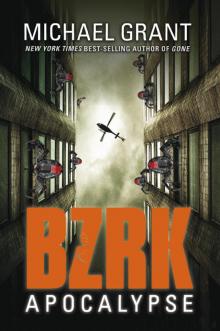 BZRK: Apocalypse
BZRK: Apocalypse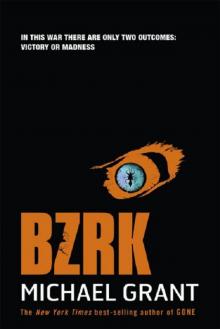 Bzrk
Bzrk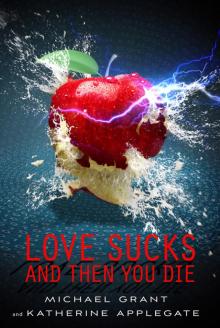 Love Sucks and Then You Die
Love Sucks and Then You Die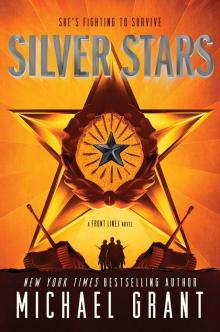 Silver Stars
Silver Stars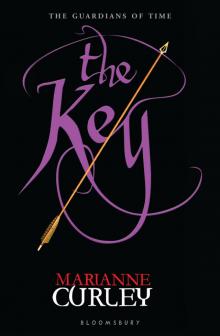 The Key
The Key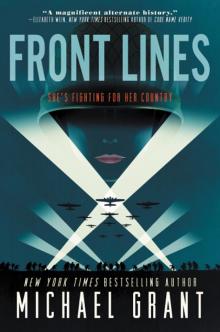 Front Lines
Front Lines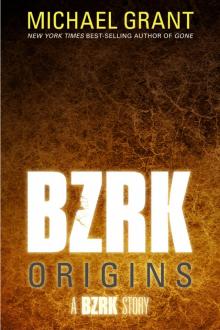 BZRK Origins
BZRK Origins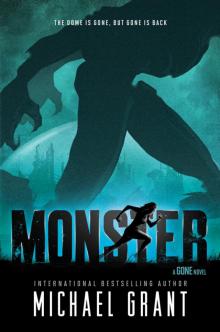 Monster
Monster Gone
Gone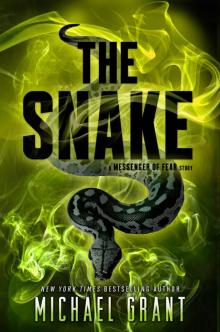 The Snake
The Snake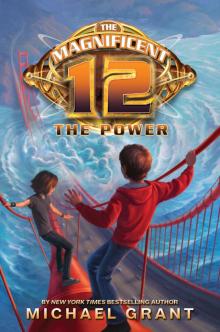 The Power
The Power Hunger
Hunger Lies
Lies A Sudden Death in Cyprus
A Sudden Death in Cyprus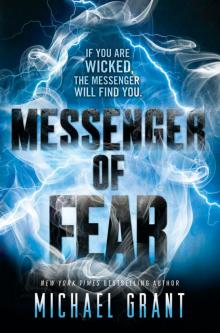 Messenger of Fear
Messenger of Fear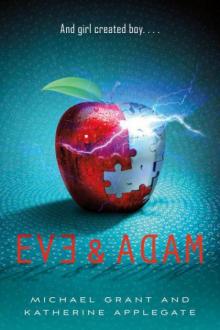 Eve & Adam
Eve & Adam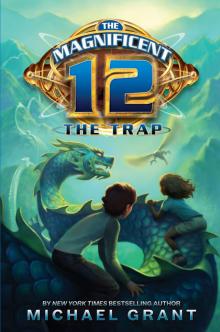 The Trap
The Trap Light
Light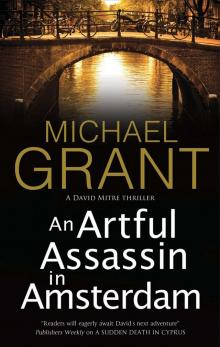 An Artful Assassin in Amsterdam
An Artful Assassin in Amsterdam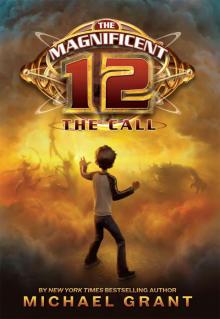 The Call
The Call Hero
Hero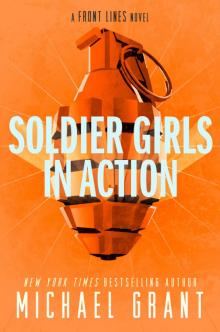 Soldier Girls in Action
Soldier Girls in Action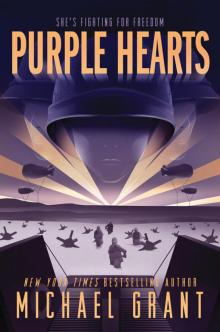 Purple Hearts
Purple Hearts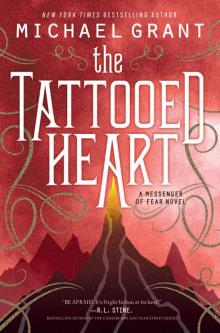 The Tattooed Heart
The Tattooed Heart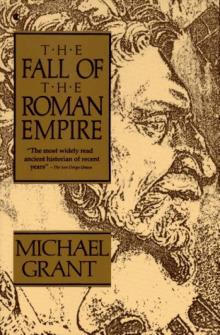 The Fall of the Roman Empire
The Fall of the Roman Empire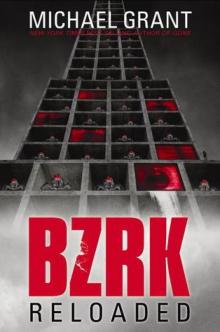 BZRK Reloaded
BZRK Reloaded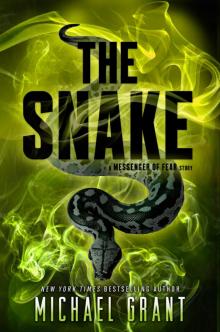 Messenger of Fear Novella #1
Messenger of Fear Novella #1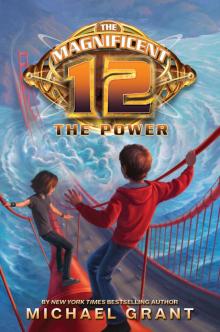 The Magnificent 12
The Magnificent 12 Fear: A Gone Novel
Fear: A Gone Novel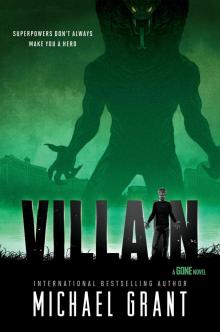 Villain
Villain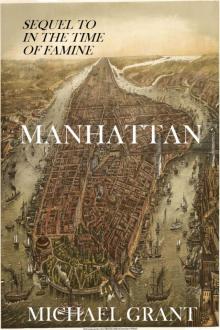 Manhattan
Manhattan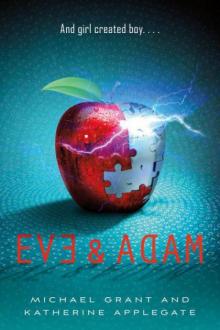 Eve and Adam
Eve and Adam Plague: A Gone Novel
Plague: A Gone Novel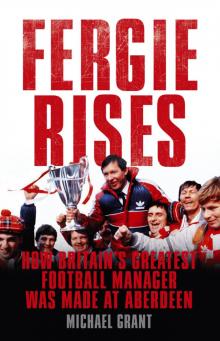 Fergie Rises
Fergie Rises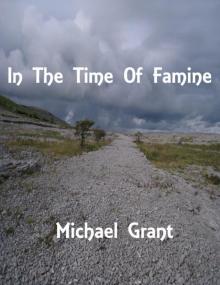 In the Time of Famine
In the Time of Famine Hunger_A Gone Novel
Hunger_A Gone Novel Lies g-3
Lies g-3